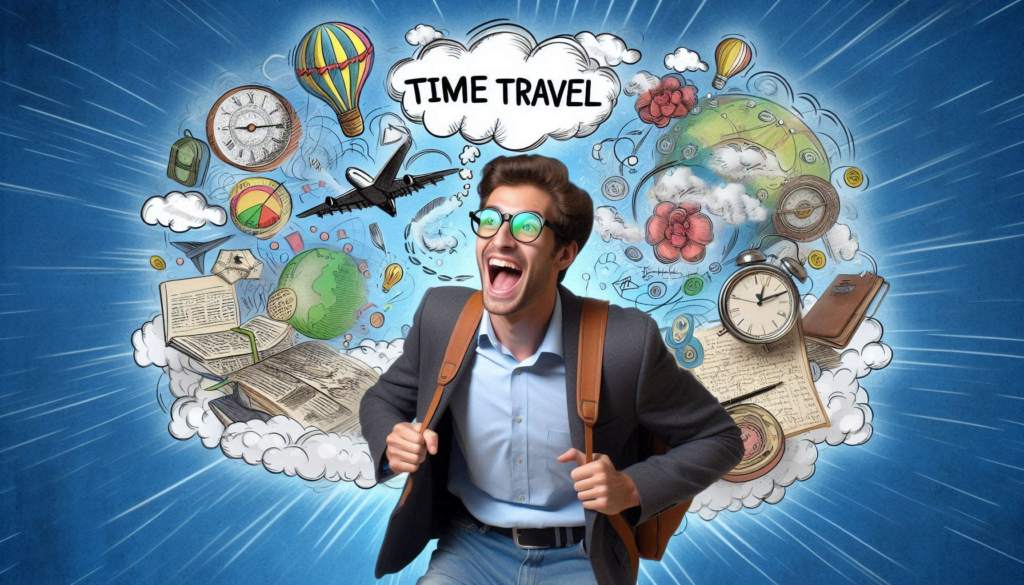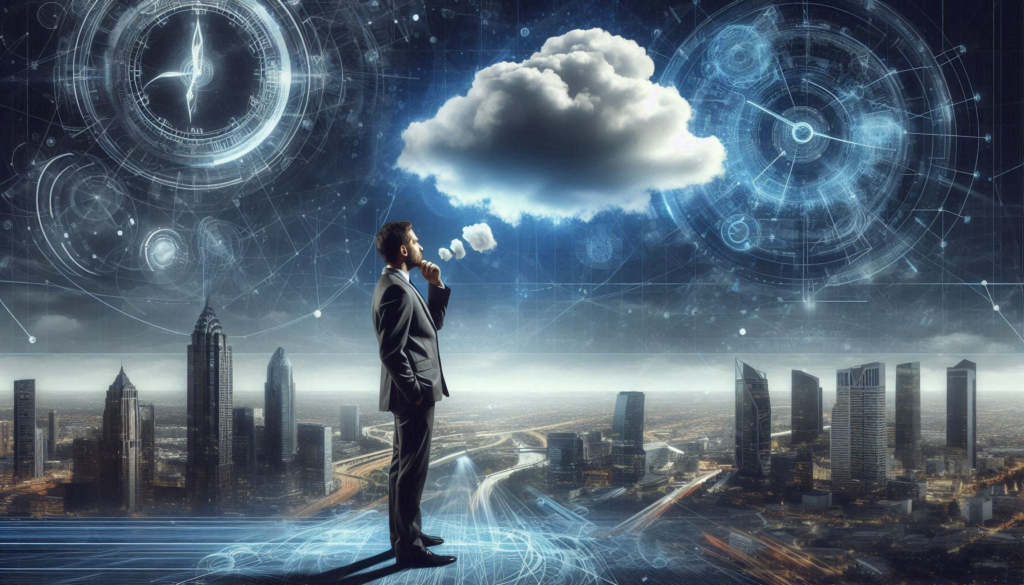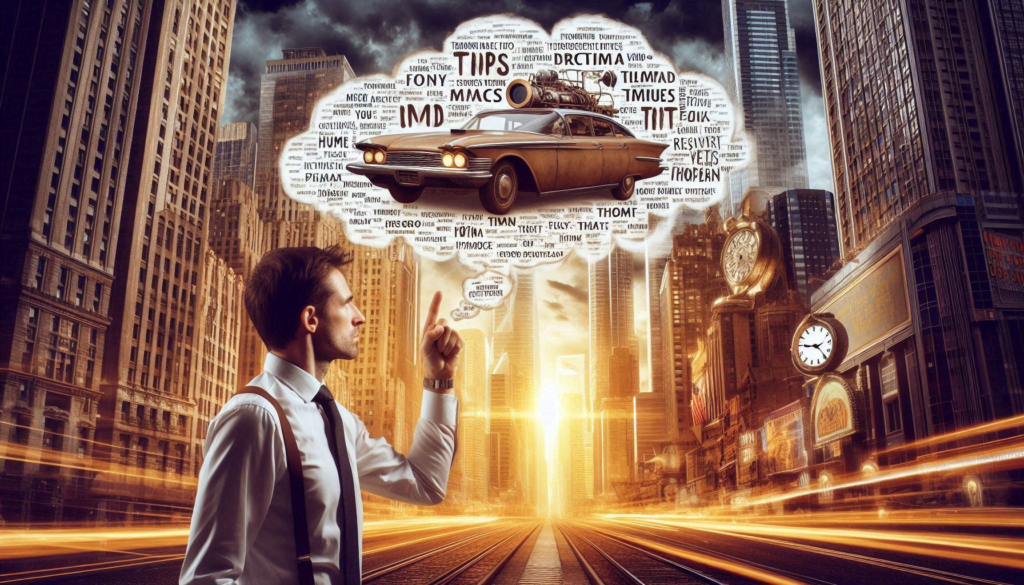
Time Travel Triumph: Quantum Leap into the 4th Dimension
Time travel, a concept that has been woven into the fabric of the human imagination for centuries, continues to fascinate the mind and give rise to endless speculations. From ancient myths of gods and heroes traveling through time to modern-day blockbuster movies and complex scientific theories, the idea of moving backward or forwards through the river of time remains both fascinating and perplexing.
Conceptual Underpinnings
At its essence, time travel involves the theoretical ability to traverse different points in time, just as we navigate through physical space. This concept challenges our understanding of time as a linear progression and opens up a realm where the past, present, and future can co-exist or intertwine.
Historical and Literary Roots
The notion of time travel finds its roots in ancient mythology and folklore, where tales of magic, enchanted objects, or divine intervention allowed mortals to glimpse or travel through different eras. However, it was not until the advent of modern literature, particularly H.G. Wells’ seminal work “The Time Machine,” that time travel took on a more structured and scientific form in the popular imagination. Wells’ novel introduced the idea of a machine that could transport its operator through time, setting a precedent for countless stories to come.
The Concept of Time Travel

Understanding Time Travel
1. Time as a Dimension:
In our everyday experience, time flows in one direction – from the past to the present, and into the future. However, in the field of theoretical physics, time is considered the fourth dimension alongside the three dimensions of space (length, width, and height). This concept allows for the idea that just as we can move forward, backward, and sideways in space, there may also be ways to traverse time.
2. Types of Time Travel:
- Forward Time Travel: Moving forward in time is a concept we all naturally experience. As time passes, we all move forward simultaneously.
- Backward Time Travel: This is the more intriguing concept, where one could hypothetically travel backward to a previous point in time, essentially revisiting or changing the past.
3. Philosophical and Paradoxical Ideas:
- The Grandfather Paradox, famous in the field of time travel, holds that changing the past to prevent your grandparents from meeting you would negate your existence. This paradox highlights the complexities and potential consequences of changing the past.
- Causal Loops: These are scenarios where an event directly or indirectly circularly affects itself. For example, you travel backward in time to give your younger self advice that ultimately leads you to travel backward in time in the first place.
4. Alternate Timelines and Multiverse Theory:
Multiverse Theory: In response to paradoxes like the grandfather paradox, some theoretical physicists propose the existence of multiple universes or timelines. Each decision or action that can change the past creates a new branch or universe, where the original timeline remains unaffected.
5. Practical and Theoretical Challenges:
- Technical Feasibility: Currently, time travel remains firmly in the realm of theory and speculation. Energy requirements, the technology needed to create and control wormholes (if they exist), and the potential dangers associated with time travel are significant hurdles.
- Moral and ethical considerations: Even if time travel were possible, questions of responsibility, the implications of altering history, and the ethical use of such technology would be paramount.
6. Time travel in literature and media:
- Literary and cultural influences: Time travel has been a staple of science fiction literature and media, giving authors and creators a chance to explore complex themes such as identity, fate, and the consequences of our actions.
- Popular representations: From H.G. Wells’ “The Time Machine” to contemporary series like “Doctor Who” and films like “Interstellar,” time travel captivates audiences with its potential for adventure and exploration of the human condition.
Time Travel in Science Fiction
Time travel in science fiction is a rich and varied theme that has been explored in countless novels, films, TV series, and other forms of storytelling. It serves as a vehicle for exploring complex ideas about time, causality, alternate realities, and the human condition. Here’s an in-depth look at how time travel is depicted and explored in the field of science fiction:
Exploring Time Paradoxes and Consequences
One of the central themes in science fiction time travel stories is the exploration of paradoxes and their consequences. The most famous paradox is the grandfather paradox, where a time traveler alters the past in such a way that he may prevent his existence. This dilemma forces characters and audiences alike to grapple with questions of causality, free will, and the ethics of altering history.
Mechanisms and Devices
Science fiction presents various mechanisms and devices for time travel, each with its own rules and limitations:
- Time Machines: Perhaps the most iconic is H.G. Wells’ concept of a mechanical device (such as a time machine) that allows a person to travel forward or backward through time at will.
- Wormholes: These hypothetical tunnels in spacetime connect distant points, potentially allowing instantaneous travel across vast temporal distances. Films such as “Interstellar” explore the concept of using wormholes for interstellar travel and time-dilation effects.
- Time portals: Portals or entrances that open to different points in time, often discovered or created through scientific or mystical means.
- Natural phenomena: Some stories use natural phenomena such as black holes or cosmic anomalies as accidental gateways to different points in time.
Narrative possibilities
Time travel offers a vast range of narrative possibilities that storytellers eagerly explore:
- Alternate history: Changing events in the past can create alternate timelines or alternate histories where key events unfold differently. This trope is used to explore what-ifs in history and the potential consequences of changing the past.
- Time loops: Characters may find themselves trapped in a repeating cycle of events, living the same period over and over again (for example, “Groundhog Day” or “Edge of Tomorrow”).
- Parallel universes: Some stories depict time travel as a gateway to parallel universes where alternate versions of events and people exist, often reflecting different choices and outcomes.
Moral and philosophical questions
Time travel stories often delve into profound moral and philosophical questions:
- Moral dilemmas: Should one change the past to prevent future tragedies or improve outcomes, even if it means altering the course of history and potentially erasing the existence of others?
- Temporal responsibility: What responsibilities do time travelers have to the people and events they encounter in the past or future? How do they handle the consequences of their actions?
- Temporal causality: How do changes in the past affect the present and the future? Can one change the future by altering the past, or are such actions predetermined?
Popular examples
- The “Back to the Future” trilogy: This series is a quintessential example of time travel in pop culture, exploring the thrills and consequences of changing the past.
- “Doctor Who”: The long-running British TV series features the Doctor, a time-traveling alien who explores the universe and interferes with historical events.
- “Looper”: This film explores the ethical implications of using time travel to commit murders and the complications that arise when past and future selves interact.
- “The Time Traveler’s Wife”: A novel (and subsequent film adaptation) that explores the impact of time travel on personal relationships and identity.
Iconic Time Travel Stories

1. “The Time Machine” by H.G. Wells
Published in 1895, H.G. Wells’ “The Time Machine” is one of the pioneering and seminal works of science fiction centered on time travel, describing the journey of an unnamed time traveler who creates a device enabling temporal transportation. He travels far into the future, witnessing the evolution of humanity into two distinct species: the peaceful Eloi and the underground-dwelling Morlocks. Through this narrative, Wells explores class divisions, industrialization, and social commentary on mankind’s distant future.
2. “Back to the Future” (film trilogy)
Directed by Robert Zemeckis and released in the 1980s, the “Back to the Future” trilogy remains a beloved classic in popular culture. The story revolves around teenager Marty McFly and eccentric scientist Dr. Emmett Brown (Doc), who embark on various adventures involving time travel using a DeLorean car that is converted into a time machine. The trilogy weaves together elements of comedy, adventure, and science fiction, exploring themes of family, destiny, and the consequences of altering the past. It is celebrated for its memorable characters, iconic soundtrack, and the enduring charm of its time-travel premise.
3. “Doctor Who” (TV series)
“Doctor Who” is a British science fiction television series that first aired in 1963 and has since become a cultural phenomenon. The show follows the adventures of the Doctor, a Time Lord from the planet Gallifrey who travels through time and space in the time machine TARDIS disguised as a British police box. The Doctor, often accompanied by companions, explores various historical periods and future worlds while facing various adversaries. The series is noted for its imaginative storytelling, complex timelines, and the Doctor’s ethical dilemmas as a time traveler who sometimes has to make difficult decisions to preserve history or change the course of events.
4. “Dark” (TV series)
“Dark,” is a German sci-fi thriller series that debuted on Netflix in 2017. The story unfolds in a small town where the disappearance of children triggers a series of events that unravel timelines spanning multiple generations. The series intensely explores themes of time travel, fate, and the cyclical nature of history. As characters travel through different eras and encounter their younger and older selves, “Dark” delves into the consequences of altering the past and the complex relationships between individuals over time.
Influence and legacy
These iconic time travel stories have not only entertained audiences but have also influenced popular culture and inspired countless adaptations, spin-offs, and discussions about the nature of time and the possibilities of time travel. They continue to captivate audiences around the world, challenging our perceptions of reality, fate, and the ethical implications of manipulating time. Whether through literature, film, or television, these narratives have given us a new perspective on the concept of time. A reminder of the enduring fascination with travel and the exploration of human identity, relationships, and the mysteries of the universe.
Time Travel in Theoretical Physics
Of course! Time travel in theoretical physics is engaged in exploring whether it is physically possible to travel to the past or future within the framework of our current understanding of the universe. While science fiction often portrays time travel as a mechanical or magical process, theoretical physics understands this concept through rigorous mathematical models and hypotheses derived from fundamental theories such as Einstein’s theory of relativity and quantum mechanics.
Relativity and Time Dilation
Albert Einstein’s theory of relativity, particularly the special theory of relativity, revolutionized our understanding of space and time. One of its key predictions relating to time travel is time dilation. Time dilation is caused by differences in the relative speed or gravitational potential between observers. It states that time moves slower for objects in motion than for objects at rest, and also in strong gravitational fields than in weak ones.
For example, experiments with high-precision atomic clocks on fast-moving aircraft or satellites have demonstrated that time does indeed dilate, albeit very minutely at the speeds we can currently achieve. This effect is real and measurable, indicating that time travel into the future (albeit by fractions of a second) is theoretically possible. As an object approaches the speed of light, time dilation becomes more pronounced, potentially causing travelers to experience significantly less time than those not moving at relativistic speeds.
Wormholes and black holes
Wormholes are hypothetical tunnels in spacetime that connect distant points, potentially allowing shortcuts across vast cosmic distances. While traversable wormholes remain entirely theoretical and their existence is still debated, they are often depicted in science fiction as gateways for instantaneous travel between different times or even different universes.
Black holes, on the other hand, are regions of spacetime where gravity is so intense that nothing, not even light, can escape from within a certain boundary called the event horizon. The study of black holes, particularly rotating (or Kerr) black holes, has led to theoretical models that suggest they may exhibit properties favorable for time travel. In particular, certain solutions to Einstein’s equations suggest the possibility of closed time-like curves (CTCs) around rotating black holes. CTCs are paths in spacetime that loop back on themselves, theoretically allowing travel back to an earlier point in time.
The Grandfather Paradox and Multiverse Theory
One of the classic paradoxes involving time travel is the grandfather paradox: if you travel backward in time and prevent your grandfather from meeting your grandmother, thus preventing your existence, how could you travel backward in time in the first place to prevent this? This paradox, along with others, raises questions about causality and the stability of timelines.
The multiverse theory offers a possible solution to such paradoxes. It posits that every possible outcome of a decision or event creates a new universe, different from the original timeline. So, if you travel backward in time and change something, you will create a new timeline or universe where those changes will take effect, while your original timeline will remain unchanged. This theory allows for the coexistence of different timelines or realities, each with its unique history and future.
Challenges and speculations
Despite these interesting theoretical possibilities, time travel faces several challenges and paradoxes that remain unresolved:
- Energy requirements: Theoretical structures such as wormholes or traversable CTCs require exotic forms of matter with negative energy density, which have never been observed and may not even exist.
- Causality violations: Traveling to the past often introduces the possibility of causality violations, where an effect may occur before its cause, leading to logical inconsistencies.
- Practical considerations: Even if theoretically possible, the engineering challenges and ethical implications of time travel remain formidable.
Conclusion: Pondering the Mysteries of Time Travel
Time travel, explored through literature, film, and theoretical physics, remains a fascinating concept that stretches the limits of human imagination and understanding. While current scientific knowledge suggests that practical time travel is beyond our current technological understanding, the exploration of this idea has led to significant advances in our understanding of fundamental theories such as relativity, quantum mechanics, and the nature of spacetime.
The Role of Science Fiction
Science fiction has played a key role in popularizing and exploring the implications of time travel. Through imaginative narratives and thought experiments, storytellers have invited audiences to consider the consequences of altering the past, navigating parallel universes, and confronting ethical dilemmas. These stories not only entertain but also stimulate deep philosophical reflection on topics such as destiny, free will, and the interconnectedness of events over time.
Theoretical Possibilities
From a scientific perspective, theories such as Einstein’s theory of relativity and the concept of wormholes offer fascinating hints at the potential feasibility of time travel. Time dilation observed in experiments with atomic clocks shows that time can be affected by velocity and gravity, suggesting the possibility of traveling into the future. Theoretical creations such as wormholes, although currently entirely hypothetical, continue to inspire researchers to explore the limits of physics and the nature of spacetime.
Ethical and philosophical considerations
Beyond scientific and fictional explorations, time travel raises profound ethical and philosophical questions. The ability to change the course of history, influence future outcomes, or traverse parallel realities challenges our understanding of causality, responsibility, and the nature of existence. Paradoxes involving time travel, such as the grandfather paradox, force us to consider the implications of our actions across different timelines and universes.
The human pursuit of understanding
Ultimately, time travel symbolizes humanity’s enduring pursuit of knowledge and exploration. It represents our desire to unravel the mysteries of the universe, confront the unknown, and expand the boundaries of what is possible. Although we do not yet have the technology to travel through time as depicted in fiction, the continuing search for understanding through scientific investigation and fictional narratives continues to fuel our curiosity and inspire future generations of scientists, philosophers, and storytellers.

Pingback: "Unlock The Secrets of Time Travel: 7 Mind-Blowing Discoveries You Must Know!" - Mind Nuggets Explorer